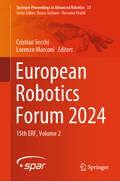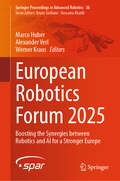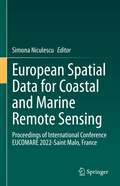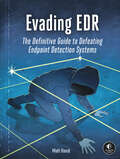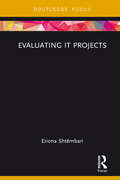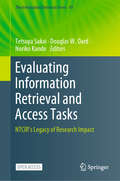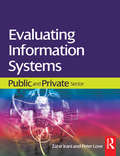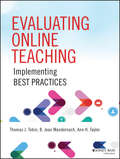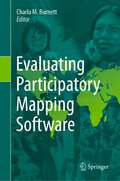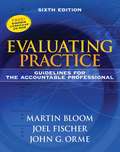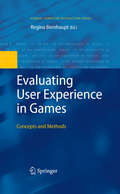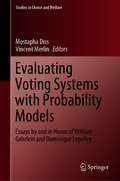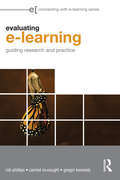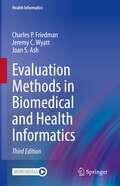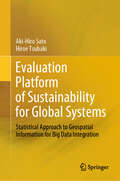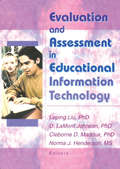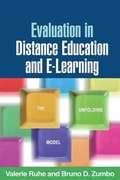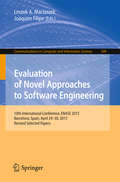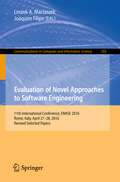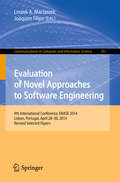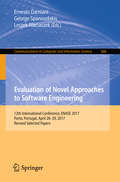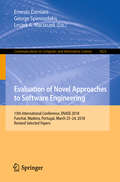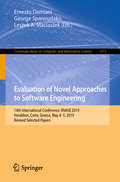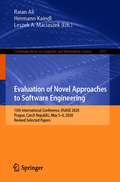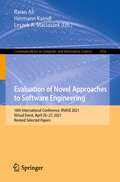- Table View
- List View
European Robotics Forum 2024: 15th ERF, Volume 2 (Springer Proceedings in Advanced Robotics #33)
by Lorenzo Marconi Cristian SecchiThis book collects the scientific contributions presented at the European Robotics Forum (ERF) 2024 that is the reference event for the EuRobotics association. In the months leading up to the forum, a direct call was launched to the many industrial players who are members of EuRobotics and who were asked to specify particularly important areas of development according to their roadmap. The outcome of this survey and the topics of the Workshops held during the forum have been used to calibrate an industry-driven scientific program where research objectives meet industrial needs. The contributions collected in the book cover a wide spectrum of robotics research, encompassing mechatronics, algorithms, Artificial Intelligence, Human-Robot Collaboration and many robotic applications.
European Robotics Forum 2025: Boosting the Synergies between Robotics and AI for a Stronger Europe (Springer Proceedings in Advanced Robotics #36)
by Werner Kraus Alexander Verl Marco HuberThis book presents a selection of peer-reviewed papers from the 16th European Robotics Forum (ERF) of euRobotics, the European Robotics Association, held in Stuttgart, Germany, from March 25–27, 2025. ERF is Europe&’s leading event for robotics and AI, bringing together researchers, industry experts, and policymakers to discuss advancements and strategic priorities in the field. The book includes 49 high-quality papers, chosen through a rigorous review process from 100 submissions. Contributions are organized into two main areas: • Robotics—Covering topics such as mechatronics, kinematics, dynamics, and safety. These papers highlight key developments in traditional robotics domains. • AI for robotics—Focusing on machine learning, foundation models, computer vision, and hybrid. AI approaches. This section explores the integration of AI into robotic systems. Providing insights into the latest research and technological advancements, this book serves as a valuable resource for researchers, engineers, and professionals working at the intersection of robotics and AI.
European Spatial Data for Coastal and Marine Remote Sensing: Proceedings of International Conference EUCOMARE 2022-Saint Malo, France
by Simona NiculescuThis volume presents full paper contributions from the International Conference of European Spatial Data for Coastal and Marine Remote Sensing (EUCOMARE) 2022, with the support of the ERASMUS+ Programme of the European Union, held in Saint Malo, France. EUCOMARE aims to promote academic and technical exchange on coastal related studies including coastal environmental and socio-economic issues, with the use of European remotely sensed data. The book is an excellent resource for scientists, engineers, and programme managers eager to learn about the recent developments and achievements in the field of remote sensing applications on marine and coastal areas. Readers will learn about recent advances in sensors' radiometric, spatial, temporal and spectral resolution, as well as new data processing approaches in remote sensing for monitoring and mapping the various characteristics of marine, coastal and aquatic systems.
Evading EDR: The Definitive Guide to Defeating Endpoint Detection Systems.
by Matt HandEDR, demystified! Stay a step ahead of attackers with this comprehensive guide to understanding the attack-detection software running on Microsoft systems—and how to evade it.Nearly every enterprise uses an Endpoint Detection and Response (EDR) agent to monitor the devices on their network for signs of an attack. But that doesn't mean security defenders grasp how these systems actually work. This book demystifies EDR, taking you on a deep dive into how EDRs detect adversary activity. Chapter by chapter, you&’ll learn that EDR is not a magical black box—it&’s just a complex software application built around a few easy-to-understand components.The author uses his years of experience as a red team operator to investigate each of the most common sensor components, discussing their purpose, explaining their implementation, and showing the ways they collect various data points from the Microsoft operating system. In addition to covering the theory behind designing an effective EDR, each chapter also reveals documented evasion strategies for bypassing EDRs that red teamers can use in their engagements.
Evaluating IT Projects (Routledge Focus on Business and Management)
by Eriona ShtëmbariProject management disciplines have been a part of IT for many years. Why then, are so many challenges still directly associated with how a project is managed? Many projects fail for a myriad of reasons; most, however, stem from poor or inadequate project evaluation and performance appraisal, while, improved project planning and direction is considered to be one of the key factors to IT project success. Eriona Shtembari arranges evaluation methods and techniques into three groups, managerial-financial-and-development. This book explores the process of project evaluation and the purposes of evaluation, given its strong relationship to the success of the project. It examines IT project evaluation; identifies methods and techniques to be used throughout the project life cycle; examines the benefits of project evaluation and proposes a systematic approach/framework of project evaluation to serve as a tool for successful project management. <P><P>Shtembari analyses the most up-to-date research relating to the process and methods/techniques of project evaluation, throughout the project life cycle. From the systematic literature review, she identifies the most usable methods and techniques in project evaluation and focuses on the adequacy of these methods and techniques in the service sector. The theoretical underpinning of the book, serves as a base to interpret the interviews in the case study and build a theory as to how the project evaluation context relates to the proposed scientific theory. The findings in this book provide solutions for practitioners to help them boost the evaluation framework and consequently improve their IT project management.
Evaluating Information Retrieval and Access Tasks: NTCIR's Legacy of Research Impact (The Information Retrieval Series #43)
by Tetsuya Sakai Noriko Kando Douglas W. OardThis open access book summarizes the first two decades of the NII Testbeds and Community for Information access Research (NTCIR). NTCIR is a series of evaluation forums run by a global team of researchers and hosted by the National Institute of Informatics (NII), Japan. The book is unique in that it discusses not just what was done at NTCIR, but also how it was done and the impact it has achieved. For example, in some chapters the reader sees the early seeds of what eventually grew to be the search engines that provide access to content on the World Wide Web, today’s smartphones that can tailor what they show to the needs of their owners, and the smart speakers that enrich our lives at home and on the move. We also get glimpses into how new search engines can be built for mathematical formulae, or for the digital record of a lived human life. Key to the success of the NTCIR endeavor was early recognition that information access research is an empirical discipline and that evaluation therefore lay at the core of the enterprise. Evaluation is thus at the heart of each chapter in this book. They show, for example, how the recognition that some documents are more important than others has shaped thinking about evaluation design. The thirty-three contributors to this volume speak for the many hundreds of researchers from dozens of countries around the world who together shaped NTCIR as organizers and participants. This book is suitable for researchers, practitioners, and students—anyone who wants to learn about past and present evaluation efforts in information retrieval, information access, and natural language processing, as well as those who want to participate in an evaluation task or even to design and organize one.
Evaluating Information Systems: Public And Private Sector
by Peter Love Zahir IraniThe adoption of Information Technology (IT) and Information Systems (IS) represents significant financial investments, with alternative perspectives to the evaluation domain coming from both the public and private sectors.As a result of increasing IT/IS budgets and their growing significance within the development of an organizational infrastructure, the evaluation and performance measurement of new technology remains a perennial issue for management. This book offers a refreshing and updated insight into the social fabric and technical dimensions of IT/IS evaluation together with insights into approaches used to measure the impact of information systems on its stakeholders. In doing so, it describes the portfolio of appraisal techniques that support the justification of IT/IS investments. Evaluating Information Systems explores the concept of evaluation as an evolutionary and dynamic process that takes into account the ability of enterprise technologies to integrate information systems within and between organisations. In particular, when set against a backdrop of organisational learning. It examines the changing portfolio of benefits, costs and risks associated with the adoption and diffusion of technology in today's global marketplace. Finally approaches to impact assessment through performance management and benchmarking is discussed.
Evaluating Online Teaching: Implementing Best Practices
by Thomas J. Tobin B. Jean Mandernach Ann H. TaylorCreate a more effective system for evaluating online faculty Evaluating Online Teaching is the first comprehensive book to outline strategies for effectively measuring the quality of online teaching, providing the tools and guidance that faculty members and administrators need. The authors address challenges that colleges and universities face in creating effective online teacher evaluations, including organizational structure, institutional governance, faculty and administrator attitudes, and possible budget constraints. Through the integration of case studies and theory, the text provides practical solutions geared to address challenges and foster effective, efficient evaluations of online teaching. Readers gain access to rubrics, forms, and worksheets that they can customize to fit the needs of their unique institutions. Evaluation methods designed for face-to-face classrooms, from student surveys to administrative observations, are often applied to the online teaching environment, leaving reviewers and instructors with an ill-fitted and incomplete analysis. Evaluating Online Teaching shows how strategies for evaluating online teaching differ from those used in traditional classrooms and vary as a function of the nature, purpose, and focus of the evaluation. This book guides faculty members and administrators in crafting an evaluation process specifically suited to online teaching and learning, for more accurate feedback and better results. Readers will: Learn how to evaluate online teaching performance Examine best practices for student ratings of online teaching Discover methods and tools for gathering informal feedback Understand the online teaching evaluation life cycle The book concludes with an examination of strategies for fostering change across campus, as well as structures for creating a climate of assessment that includes online teaching as a component. Evaluating Online Teaching helps institutions rethink the evaluation process for online teaching, with the end goal of improving teaching and learning, student success, and institutional results.
Evaluating Participatory Mapping Software
by Charla M. BurnettThis volume provides a framework for evaluating geospatial software for participatory mapping. The evaluation is based on ten key indicators: ethics, cost, technical level, inclusiveness, data accuracy, data privacy, analytical capacity, visualization capacity, openness, and accessibility (i.e., mobile friendly or offline capabilities). Each application is evaluated by a user and cross analyzed with specific case studies of the software’s real-world application. This framework does not discriminate against assessing volunteered geographic information (VGI) applications, as a form of participatory mapping, in circumstances that its application is spearheaded by underrepresented groups with the intent to empower and spark political or behavioral change within formal and informal institutions. Each chapter follows a strict template to ensure that the information within the volume can be updated periodically to match the ever-changing technological environment. The book covers twelve different mapping applications with the goal of creating a comparative evaluation framework that can be easily interpreted by convening institutions and novice users. This will also help identify gaps in software for participatory mapping which will help to inform application development in the future and updates to current geospatial software.
Evaluating Practice: Guidelines for the Accountable Professional
by Martin Bloom Joel Fischer John G. OrmeFocusing on single-system designs, Evaluating Practice, 6/e presents clear guidelines on conceptualizing and measuring problems, developing practice-oriented evaluation designs, understanding and analyzing data, and ethical guidelines for practice evaluation.
Evaluating User Experience in Games
by Regina BernhauptUser Experience has become a major research area in human-computer interaction. The area of game design and development has been focusing on user experience evaluation for the last 20 years, although a clear definition of user experience is still to be established. The contributors to this volume explore concepts that enhance the overall user experience in games such as fun, playability, flow, immersion and many others. Presenting an overview of current practice from academia and industry in game development, the book shows a variety of methods that can be used to evaluate user experience in games, not only during game-play but also before and after the game play. Evaluating User Experiences in Games: Presents a broad range of user experience evaluation methods and concepts; Provides insights on when to apply the various user experience evaluation methods in the development cycle and shows how methods can be also applied to a more general HCI context; Includes new research on evaluating user experience during game play and after; and social play; Describes new evaluation methods; Details methods that are also applicable for exertion games or tabletop games. This comprehensive book will be welcomed by researchers and practitioners in the field.
Evaluating Voting Systems with Probability Models: Essays by and in Honor of William Gehrlein and Dominique Lepelley (Studies in Choice and Welfare)
by Mostapha Diss Vincent MerlinThis book includes up-to-date contributions in the broadly defined area of probabilistic analysis of voting rules and decision mechanisms. Featuring papers from all fields of social choice and game theory, it presents probability arguments to allow readers to gain a better understanding of the properties of decision rules and of the functioning of modern democracies. In particular, it focuses on the legacy of William Gehrlein and Dominique Lepelley, two prominent scholars who have made important contributions to this field over the last fifty years. It covers a range of topics, including (but not limited to) computational and technical aspects of probability approaches, evaluation of the likelihood of voting paradoxes, power indices, empirical evaluations of voting rules, models of voters’ behavior, and strategic voting. The book gathers articles written in honor of Gehrlein and Lepelley along with original works written by the two scholars themselves.
Evaluating e-Learning: Guiding Research and Practice (Connecting with E-learning)
by Rob Phillips Carmel McNaught Gregor KennedyHow can novice e-learning researchers and postgraduate learners develop rigorous plans to study the effectiveness of technology-enhanced learning environments? How can practitioners gather and portray evidence of the impact of e-learning? How can the average educator who teaches online, without experience in evaluating emerging technologies, build on what is successful and modify what is not? By unpacking the e-learning lifecycle and focusing on learning, not technology, Evaluating e-Learning attempts to resolve some of the complexity inherent in evaluating the effectiveness of e-learning. The book presents practical advice in the form of an evaluation framework and a scaffolded approach to an e-learning research study, using divide-and-conquer techniques to reduce complexity in both design and delivery. It adapts and builds on familiar research methodology to offer a robust and accessible approach that can ensure effective evaluation of a wide range of innovative initiatives, including those covered in other books in the Connecting with e-Learning series. Readers will find this jargon-free guide is a must-have resource that provides the proper tools for evaluating e-learning practices with ease.
Evaluation Methods in Biomedical and Health Informatics (Health Informatics)
by Joan S. Ash Charles P. Friedman Jeremy C. WyattHeavily updated and revised from the successful first edition Appeals to a wide range of informatics professionals, from students to on-site medical information system administrators Includes case studies and real world system evaluations References and self-tests for feedback and motivation after each chapter Great for teaching purposes, the book is recommended for courses offered at universities such as Columbia University Precise definition and use of terms
Evaluation Platform of Sustainability for Global Systems: Statistical Approach to Geospatial Information for Big Data Integration
by Aki-Hiro Sato Hiroe TsubakiThe authors of this book assert that Grid Square statistics, a method of aggregating data within a geographically defined Grid, may be an effective solution to approach geospatial data for big data integration. Grid Square statistics is a technique that allows us to collect and analyze data based on Grids and makes it easier to understand patterns and trends. Sustainability, a key concern for the future of our society, often involves balancing multiple independent objectives. These objectives and key performance indicators must be shared to solve multi-dimensional optimization problems with some constraints related to sustainability issues. However, many of these sustainability issues are challenges that are part of global systems, which are modeled as a complex system consisting of many components. Social, economic, and environmental aspects in our socio-economic systems require solutions designed for the sustainability of our society. These conditions imply that Big Data must contribute to evaluating our current situation, actions, and changes to continuously change our behavior and society based on a Plan-Do-Check-Action (PDCA) cycle. The PDCA cycle, also known as the Deming cycle, is a four-step management method used to improve processes and products continuously. We must understand how to construct a platform by using Big Data to do so. Thus, extracting meaningful information from Big Data is crucially important in the advanced information society. This book provides case studies based on Grid Square statistics. It shows their applications to socio-economic and environmental problems such as tourism, where we analyze visitor patterns to optimize resource allocation, SDGs indicator, where we monitor the sustainability of our socio-economic systems, and disaster management, where we face natural disaster to enhance preparedness. Finally, the book proposes a World Grid Square Statistics Reference Architecture for constructing data applications across organizations and domains and reports on design concepts, system architecture, and the implication of a data platform for World Grid Square data and statistics.
Evaluation and Assessment in Educational Information Technology
by Cleborne D Maddux D Lamont Johnson Leping Liu Norma HendersonChoose the right hardware and software for your school!This unique book is the first systematic work on evaluating and assessing educational information technology. Here you?ll find specific strategies, best practices, and techniques to help you choose the educational technology that is most appropriate for your institution. Evaluation and Assessment in Educational Information Technology will show you how to measure the effects of information technology on teaching and learning, help you determine the extent of technological integration into the curriculum that is best for your school, and point you toward the most effective ways to teach students and faculty to use new technology.Evaluation and Assessment in Educational Information Technology presents: a summary of the last ten years of assessment instrument development seven well-validated instruments that gauge attitudes, beliefs, skills, competencies, and technology integration proficiencies two content analysis instruments for analyzing teacher-student interaction patterns in a distance learning setting an examination of the best uses of computerized testing--as opposed to conventional tests, as used in local settings, to meet daily instructional needs, in online delivery programs, in public domain software, and available commercial and shareware options successful pedagogical and assessment strategies for use in online settings a four-dimensional model to assess student learning in instructional technology courses three models for assessing the significance of information technology in education from a teacher?s perspective an incisive look at Michigan?s newly formed Consortium of Outstanding Achievement in Teaching with Technology (COATT) ways to use electronic portfolios for teaching/learning performance assessment and much more!
Evaluation in Distance Education and E-Learning
by Valerie Ruhe Bruno ZumboWith the rapid proliferation of distance education and e-learning courses, the need is growing for a comprehensive, professional approach to evaluating their effectiveness. This indispensable book offers a road map to guide evaluation practice in these innovative learning environments. Providing practical, step-by-step guidelines and tools for conducting evaluation studies including how to deal with stakeholders, develop surveys and interview protocols, collect other scientific evidence, and analyze and blend mixed-methods data the work also features a template for writing high-quality reports. The "unfolding model" developed by the authors draws on Messick's influential assessment framework and applies it to program evaluation. Two case studies of actual programs (a distance learning course and an e-learning course) demonstrate the unfolding model in action.
Evaluation of Novel Approaches to Software Engineering
by Leszek A. Maciaszek Joaquim FilipeThis book contains a collection of thoroughly refereed papers presented at the 5th International Conference on Evaluation of Novel Approaches to Software Engineering, ENASE 2010, held in Athens, Greece, in July 2010. The 19 revised and extended full papers were carefully selected from 70 submissions. They cover a wide range of topics, such as quality and metrics; service and Web engineering; process engineering; patterns, reuse and open source; process improvement; aspect-oriented engineering; and requirements engineering.
Evaluation of Novel Approaches to Software Engineering
by Leszek A. Maciaszek Joaquim FilipeThis book constitutes the thoroughly refereed proceedings of the 8th International Conference on Evaluation of Novel Approaches to Software Engineering, ENASE 2013, held in Angers, France, in July 2013. The 18 full papers presented were carefully reviewed and selected from 46 submissions. The papers reflect a growing effort to increase the dissemination of new results among researchers and professionals related to evaluation of novel approaches to software engineering. By comparing novel approaches with established traditional practices and by evaluating them against software quality criteria, the ENASE conferences advance knowledge and research in software engineering, identify most hopeful trends, and propose new directions for consideration by researchers and practitioners involved in large-scale software development and integration.
Evaluation of Novel Approaches to Software Engineering
by Leszek A. Maciaszek Joaquim FilipeThis book contains a collection of thoroughly refereed papers presented at the 5th International Conference on Evaluation of Novel Approaches to Software Engineering, ENASE 2010, held in Athens, Greece, in July 2010. The 19 revised and extended full papers were carefully selected from 70 submissions. They cover a wide range of topics, such as quality and metrics; service and Web engineering; process engineering; patterns, reuse and open source; process improvement; aspect-oriented engineering; and requirements engineering.
Evaluation of Novel Approaches to Software Engineering: 12th International Conference, ENASE 2017, Porto, Portugal, April 28–29, 2017, Revised Selected Papers (Communications in Computer and Information Science #866)
by Leszek Maciaszek Ernesto Damiani George SpanoudakisThis book constitutes the thoroughly refereed proceedings of the 12th International Conference on Evaluation of Novel Approaches to Software Engineering, ENASE 2017, held in Porto, Portugal, in April 2017.The 12 full papers presented were carefully reviewed and selected from 102 submissions. The mission of ENASE is to be a prime international forum to discuss and publish research findings and IT industry experiences with relation to the evaluation of novel approaches to software engineering. The conference acknowledges necessary changes in systems and software thinking due to contemporary shifts of computing paradigm to e-services, cloud computing, mobile connectivity, business processes, and societal participation.
Evaluation of Novel Approaches to Software Engineering: 13th International Conference, ENASE 2018, Funchal, Madeira, Portugal, March 23–24, 2018, Revised Selected Papers (Communications in Computer and Information Science #1023)
by Leszek A. Maciaszek Ernesto Damiani George SpanoudakisThis book constitutes the refereed proceedings of the 13th International Conference on Evaluation of Novel Approaches to Software Engineering, ENASE 2018, held in Funchal, Madeira, Portugal, in March 2018.The 17 revised full papers and 5 revised short papers presented were carefully reviewed and selected from 95 submissions. The papers are organized in topical sections on service science and business information systems and software engineering.
Evaluation of Novel Approaches to Software Engineering: 14th International Conference, ENASE 2019, Heraklion, Crete, Greece, May 4–5, 2019, Revised Selected Papers (Communications in Computer and Information Science #1172)
by Leszek A. Maciaszek Ernesto Damiani George SpanoudakisThis book constitutes the refereed proceedings of the 14th International Conference on Evaluation of Novel Approaches to Software Engineering, ENASE 2019, held in Heraklion, Crete, Greece, in May 2019.The 19 revised full papers presented were carefully reviewed and selected from 102 submissions. The papers included in this book contribute to the understanding of relevant trends of current research on novel approaches to software engineering for the development and maintenance of systems and applications, specically with relation to: model-driven software engineering, requirements engineering, empirical software engineering, service-oriented software engineering, business process management and engineering, knowledge management and engineering, reverse software engineering, software process improvement, software change and configuration management, software metrics, software patterns and refactoring, application integration, software architecture, cloud computing, and formal methods.
Evaluation of Novel Approaches to Software Engineering: 15th International Conference, ENASE 2020, Prague, Czech Republic, May 5–6, 2020, Revised Selected Papers (Communications in Computer and Information Science #1375)
by Leszek A. Maciaszek Raian Ali Hermann KaindlThis book constitutes selected, revised and extended papers of the 15th International Conference on Evaluation of Novel Approaches to Software Engineering, ENASE 2020, held in virtual format, in May 2020.The 19 revised full papers presented were carefully reviewed and selected from 96 submissions. The papers included in this book contribute to the understanding of relevant trends of current research on novel approaches to software engineering for the development and maintenance of systems and applications, specically with relation to: model-driven software engineering, requirements engineering, empirical software engineering, service-oriented software engineering, business process management and engineering, knowledge management and engineering, reverse software engineering, software process improvement, software change and configuration management, software metrics, software patterns and refactoring, application integration, software architecture, cloud computing, and formal methods.
Evaluation of Novel Approaches to Software Engineering: 16th International Conference, ENASE 2021, Virtual Event, April 26-27, 2021, Revised Selected Papers (Communications in Computer and Information Science #1556)
by Leszek A. Maciaszek Raian Ali Hermann KaindlThe present book includes extended and revised versions of a set of selected papers from the 16th International Conference on Evaluation of Novel Approaches to Software Engineering (ENASE 2021), held as an online event from April 26 to 27, 2021.The 15 revised full papers presented were carefully reviewed and selected from 96 submissions. The papers included in this book contribute to the understanding of relevant trends of current research on novel approaches to software engineering for the development and maintenance of systems and applications, specically with relation to: model-driven software engineering, requirements engineering, empirical software engineering, service-oriented software engineering, business process management and engineering, knowledge management and engineering, reverse software engineering, software process improvement, software change and configuration management, software metrics, software patterns and refactoring, application integration, software architecture, cloud computing, and formal methods.
